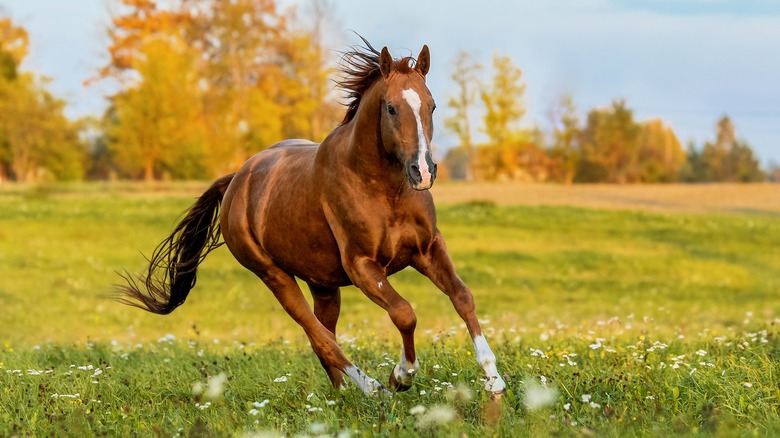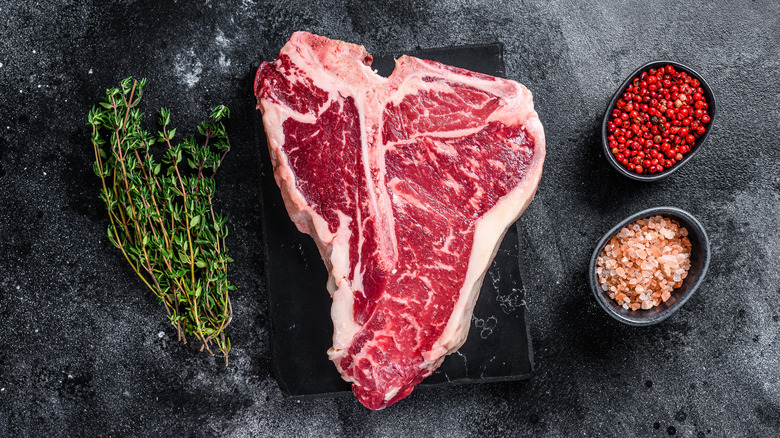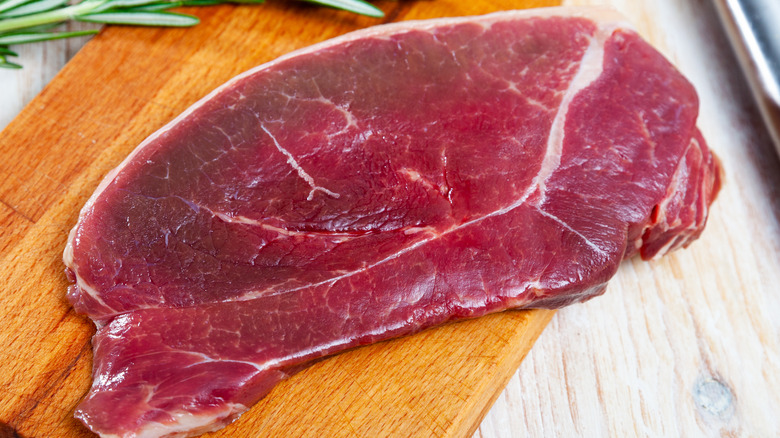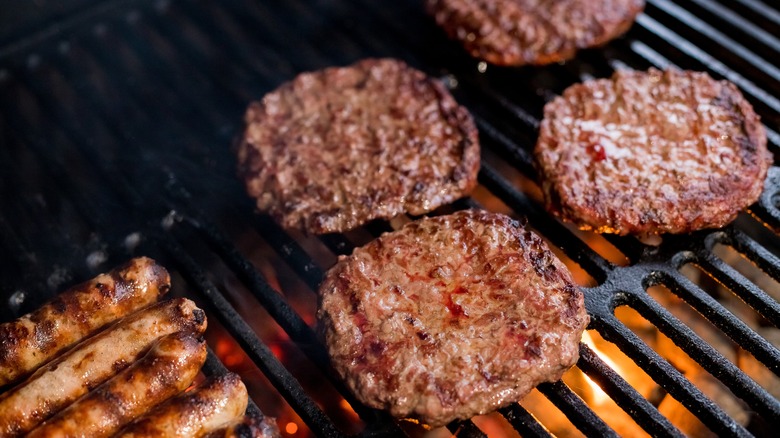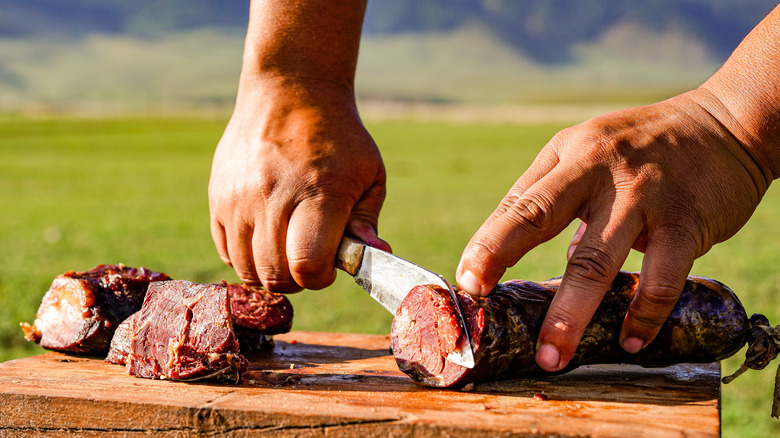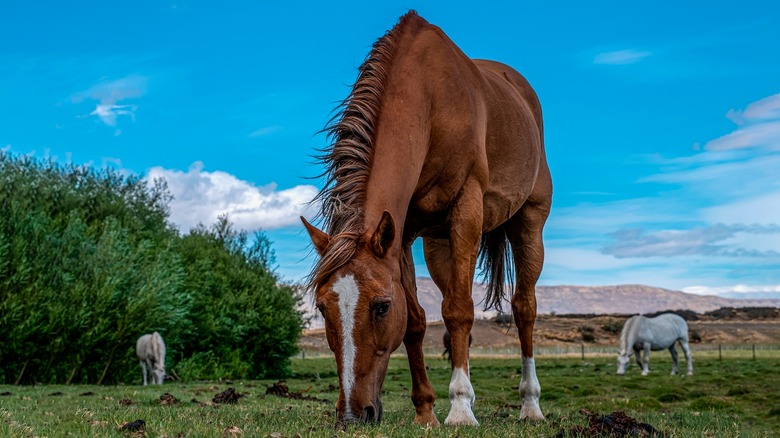Horse Meat Tastes Exactly Like Beef And I Bet You Couldn't Tell The Difference
Many people eat meat, but even amongst committed carnivores, the muscle tissue of some animals seems to be off-limits. Horse meat is one of those that divides opinions. Its consumption in certain cultures is routine, while others believe it is on par with eating a family pet. In many countries, it's part of the national menu. In others, it's not normally eaten, but likely to be one of the first animals to hit the pan in a time of widespread crisis. Then there are some people and places that couldn't picture dining on equine under any circumstances.
Even if the idea of eating horse meat turns your stomach, there's a good chance you've at least tried something very similar. I've personally eaten horse willingly on several occasions and may have also consumed a bit of it by accident. The intended consumption occurred over the course of several trips to France I've taken throughout my life. "Cheval" isn't as common as beef over there, but it is still pretty easy to find. You may spot it on a regular restaurant's menu, or you might head to a place known for its horse meat. If you're not staying in a hotel, you also have the option of buying a horse steak from a supermarket and cooking it yourself.
You'll probably recognize its flavor
If you haven't spent your whole life as a vegetarian, there's a good chance you've eaten something almost indistinguishable from horse. It isn't some obscure exotic animal lump, it isn't a vegetable, and it certainly isn't one of those things that "just tastes like chicken." But it does taste remarkably similar to another very common meat, beef. In my experience, a mare's meat is almost indistinguishable from the humble cow. I'm sure there are experts out there with more refined palates than mine, but the majority of people wouldn't be able to spot the difference between the two.
You would really expect something else, like a certain gaminess, or a deeper richness, or something unique about the meat. Certain cuts may actually be like that, but I'm not sure. All I can say for certain is, every time I've eaten it, it's been exactly like a piece of cow — fried medium-rare in the case of steaks or well done if it's a burger. So if you're a big fan of beef, and have no particularly deep ethical concerns, then trying horse when the opportunity arises won't leave you disappointed.
The texture is a bit different
Where horse will stand out from most beef is in its composition. It's a noticeably leaner meat, closer to something like buffalo or bison. It's also noticeably tougher, but this isn't much of a surprise. As with cows, the harder a muscle works, the tougher it becomes. That's why the filet, which does next to nothing, is remarkably tender, while the chuck, which constantly supports and moves the cow's enormous weight, is a pretty tough cut. A horse is full of powerful, hard-working muscles, so it's going to supply a lot of pretty tough meat.
I'm not exactly sure what parts of the horse the steaks I had came from, but they were similar to a cow's rump in terms of texture and fat distribution. This part isn't meant to put you off, and I know for a fact there are other ways of preparing horse that mitigates these issues but don't order it and expect to receive something as fatty and tender as a ribeye. I have yet to encounter a horse tenderloin, and I'm unsure of whether or not a horse does something that toughens up that muscle, but I'd certainly like to give on a try to see how it compares to its bovine counterpart.
It makes a decent burger
Horse makes better burger meat than it does a steak. As with everything else, grinding a cut of horse is a great way to mitigate the meat's textural issues. From what I remember, my burger was a touch on the leaner side. Not quite as lean as venison, but not that perfect 80/20 meat-to-fat ratio many burger aficionados tend to look for. Still, it was very good — it was smothered in delightful truffle aioli and is undoubtedly my best horse-munching experience.
If you somehow find yourself making your own horse burgers, you may be able to either source a cut with the ideal meat-to-fat ratio or find a bit of additional horse fat to top up the balance. In a worst-case scenario, beef fat is an ideal substitute. As far as sauces and seasoning go, anything that pairs well with beef will saddle up with horse, no problem. Beyond burgers, lean horse meat is versatile and can be used for many other applications. As with venison, its leanness makes horse meat a great candidate for jerky or sausage. Or, you can salt, air dry, and slice it to make cured meat, like bresaola.
Don't let cultural considerations put you off
There are plenty of valid reasons not to eat horse or meat in general, including simply not doing so on religious, health, or ethical grounds. But limiting your diet because the eating of a particular food isn't widely practiced on the particular bit of land you grew up on isn't really a valid reason. If that logic was applied evenly, French people wouldn't eat Chinese food, and everyone in Germany would stick to wurst, schnitzel, and fermented cabbage. If Italians had stuck to that rule a few hundred years ago, the world wouldn't have pasta or any tomato-based Italian foods.
Taboos based around things like perceived "cuteness" are also strange if that rule is applied consistently. Lambs are pretty cute, but parts of them often end up skewered on the end of a fork. Piglets are very endearing, but bacon is a staple part of the American diet. Even rabbits, which are one of the most common pets, were also a regular part of people's diets in the not-too-distant past. So if there aren't any hard religious or ethical barriers, and your hesitancy is just a case of you wanting to stay in your comfort zone, then it may be time to branch out and give things a try.
So, should you eat horse?
So after all this, should you try horse? Well, that's up to you. You shouldn't be pressured into breaking any boundaries you set, and you're not really missing out on too much anyway. On the flip side, you shouldn't be bullied into not eating it either, if that's what you really want to do. We currently live in a society where cultures are constantly mixing, and we shouldn't expect people to give up their traditional dietary practices any more than we expect them to give up their religion, cultural dress, or language.
For others, it may just be difficult to get. If you live in the United States, it probably isn't worth hopping on an international flight, booking hotels, and seeking out a restaurant for something that tastes just like beef but has an inferior texture.
From a personal standpoint, I wouldn't object to eating horse again, and may even seek it out if I'm traveling with friends or family who are up for trying something you can't get back home. If I'm alone, it's a bit like seeing something like bison on the menu. I might think, "why not?" but equally, I could just fancy seafood that night.
